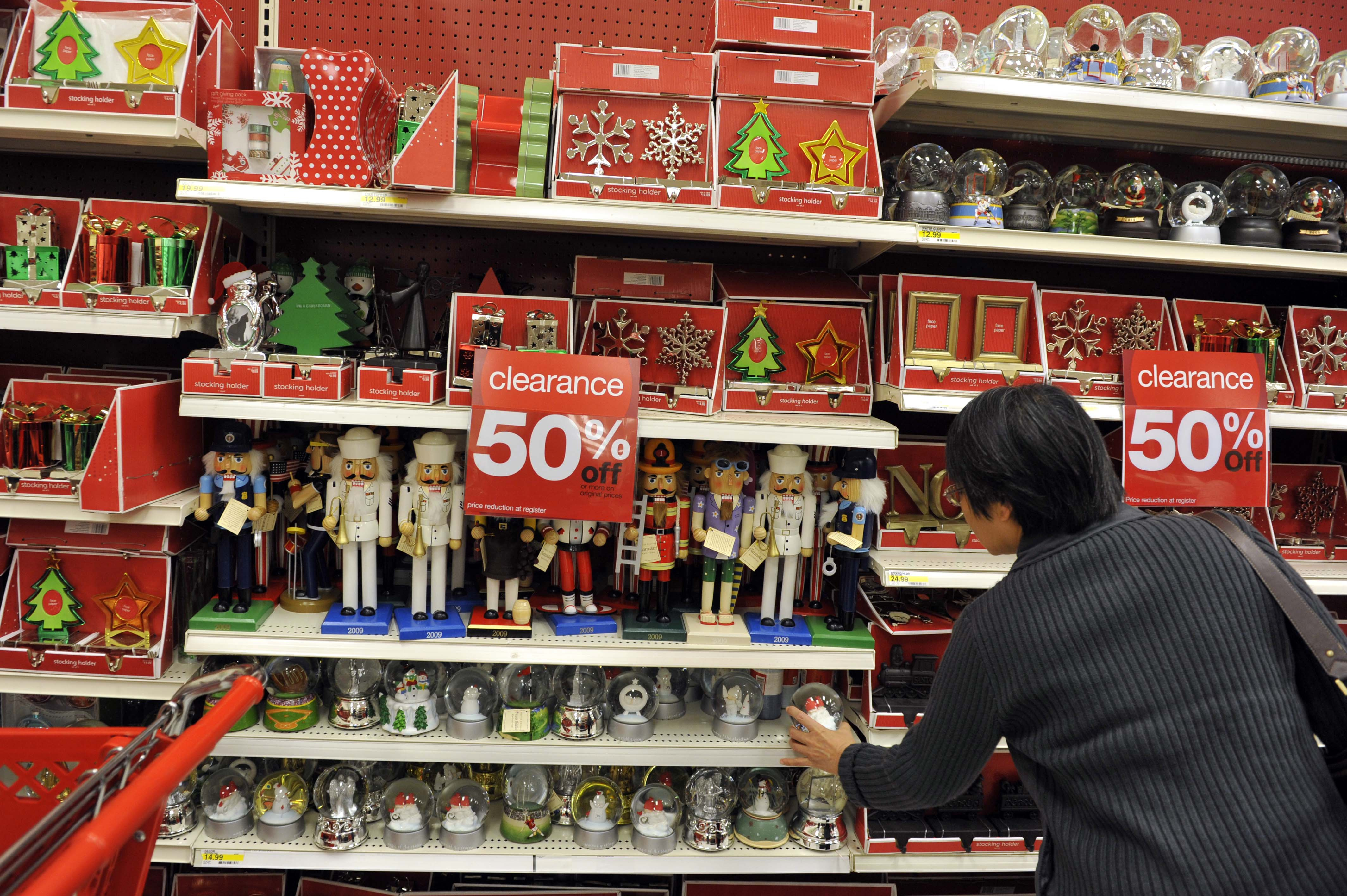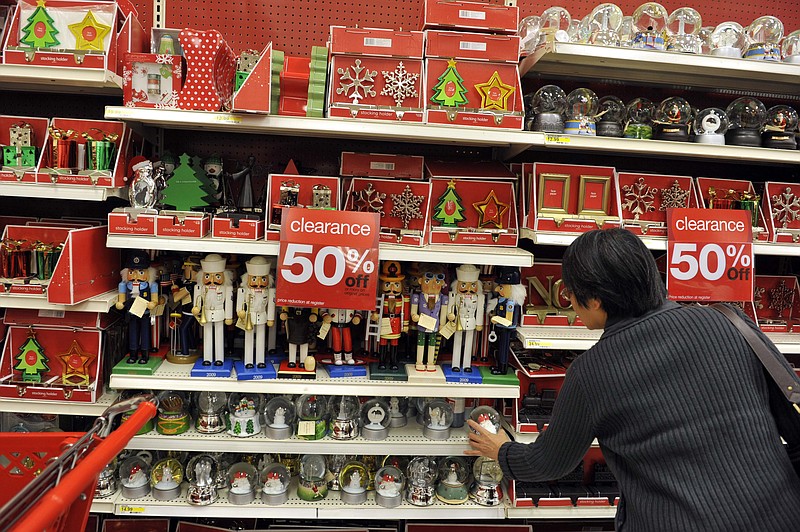 Lots of people postpone Christmas celebrations because their jobs don't pause for the holiday traditionally intended to commemorate the birth of Christ. But in the weak economy, some are delaying Christmas for another reason: money. It's so prevalent that this year, Deloitte's annual holiday survey for the first time asked shoppers whether they planned to wait until January to do the bulk of their shopping for Christmas 2011. Six percent of the more than 5,000 respondents said they are planning to wait.
Lots of people postpone Christmas celebrations because their jobs don't pause for the holiday traditionally intended to commemorate the birth of Christ. But in the weak economy, some are delaying Christmas for another reason: money. It's so prevalent that this year, Deloitte's annual holiday survey for the first time asked shoppers whether they planned to wait until January to do the bulk of their shopping for Christmas 2011. Six percent of the more than 5,000 respondents said they are planning to wait.By CHRISTINA REXRODE
AP Retail Writer
NEW YORK - When Emily Russell's two young sons wake up on Christmas morning, they'll find that Santa left them a note instead of the videogames they requested.
"Hey, I couldn't get by your house last night," Russell, a single mother from Kernersville, N.C., plans to write to her sons and sign Santa's name. "Your mom is going to take you to the store when she can."
Some people have always postponed Christmas celebrations because their jobs don't pause for the holiday. But in the weak economy, folks are delaying Christmas for another reason: money.
Deloitte's annual holiday survey for the first time asked shoppers whether they planned to wait until January to do the bulk of their shopping for Christmas. Six percent of the more than 5,000 respondents said they did.
The strategy can pay off. After Christmas, retailers offer discounts of up to 75 percent on a wider variety of items than they do in the weeks leading up to the holiday.
It's something cost-conscious shoppers have gotten hip to. Retail sales during the seven days after Christmas rose year-over-year in three of the past five years, according to research firm ShopperTrak. And last year, year-over-year online spending grew by 22 percent on Dec. 26 and 56 percent on Dec. 27, according to computer giant IBM's retail consulting arm.
Elaine Wu and her husband plan to wait until the day after Christmas to shop because they've agreed not to spend more than $150 for each other - a difficult task given they like to splurge on upscale Marc Jacobs handbags and Armani shoes.
Wu says she's also waiting until after Christmas to shop for some of her friends. Real friends, she figures, wouldn't want her to go through the headache of shopping in the pre-Christmas madness anyway.
"Just because it's a day late doesn't mean it's going to be any less special or didn't come from the same sentiment," says Wu, 36, a marketing manager for the startup website BlogHer in Silicon Valley. "It just means that it's going to save us 60 percent."
Postponing Christmas Day, originally a Christian holiday to celebrate the birth of Christ, is almost unheard of in some circles. About 95 percent of Americans celebrate Christmas - including 80 percent of non-Christians, according to Gallup polls.
But Bruce David Forbes, author of "Christmas: A Candid History," says those who delay Christmas festivities can take some comfort in the fact that Dec. 25 isn't the date of the birth of Christ.
When Christians started celebrating his birth in the 300s after the Roman emperor Constantine converted to that religion, they didn't know the birthdate, so it appears that they picked a day to coincide with Romans' midwinter celebrations of their own gods. Meanwhile, Christians in more eastern countries, like Turkey and Greece, were already celebrating on Jan. 6.
So, Forbes, who teaches religious studies at Morningside College in Sioux City, Iowa, says if you're celebrating anywhere between Dec. 25 and Jan. 6, "you're not even doing it late."
That may be a relief to Mujtaba Al-Qudaihi of Baltimore, Md., who plans to spend Dec. 25 watching a movie, catching up on reading or killing time on the Internet. His real Christmas celebration - which includes his dad dressing up as Santa and the extended family exchanging gifts and eating a big meal - will happen a few days later.
That's because it's cheaper for Al-Qudaihi and other relatives to fly to his parents' home in Indianapolis after Christmas. Besides, Al-Qudaihi figures that the prices on gifts he plans to buy will be much cheaper after Christmas.
"Nothing changes," says Al-Qudaihi, 27, who works in information-technology consulting for a public university. "Just the date."
Danielle McCurley of Lacey, Wash., also is planning to postpone Christmas a couple days. She wants to wait until her financial aid check for her school tuition arrives so she can spend the extra money on gifts.
In normal years, McCurley would have finished her Christmas shopping weeks ago. But this year is different: After losing her job as a home health aide, McCurley, 32, returned to school to study social work this fall. Adding to that, her husband, Mario, was out of work for a year and a half, though he recently found a job as a security guard.
McCurley, who has three children ages 4, 5 and 11, thinks her youngest two won't really notice. Her oldest will, but she already bought his present: a secondhand netbook that she got for a third of the original price at $100. And she figures her mom, her three brothers and her husband won't really mind the late presents.
"They're adults," McCurley says. "I don't think they'll be too upset."
Meanwhile, Russell, the North Carolinian mom, isn't sure how her sons, ages 8 and 10, will react when they learn Christmas will come late for them.
Postponing the celebration is the only way Russell, a customer service worker, can manage to afford Christmas this year because she had to take two weeks off without pay recently when her youngest had his tonsils removed. She figures if she waits until after Christmas to go shopping, she'll be able to scrounge up money to buy each boy a video game, a board game and one piece of clothing.
"It might be a little upsetting to start with," says Russell, 41. "I'll tell them, 'I'm sorry Santa didn't come by today. Maybe he'll come by next week."'
---
Follow AP retail coverage at http://www.twitter.com/AP-Retail
